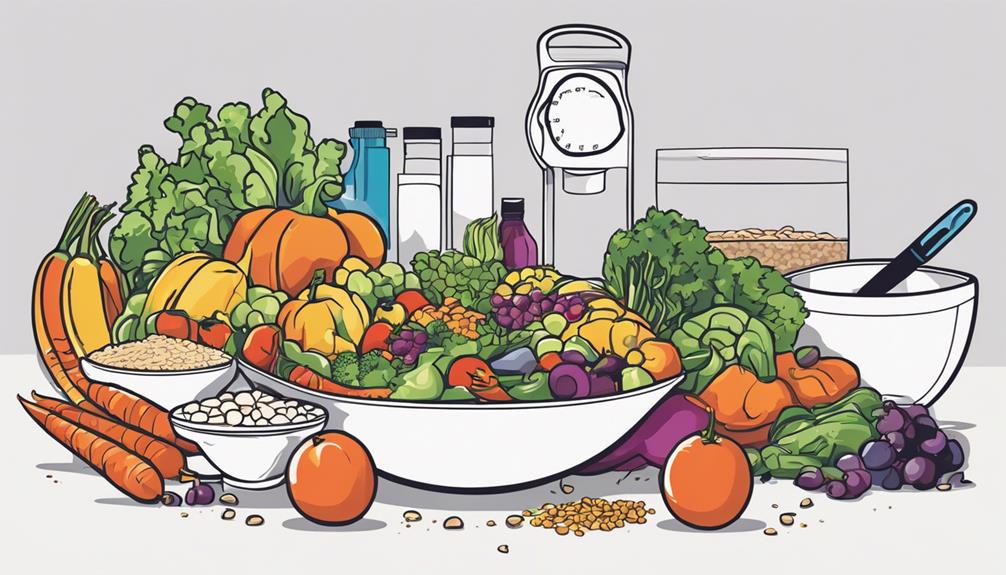When it comes to managing diabetes effectively, incorporating balanced meals is key. Understanding the importance of carb counting, portion control, meal prepping, and smart snacking choices can significantly impact your blood sugar levels.
But have you ever wondered how to seamlessly integrate these meal planning techniques into your daily routine? Stay tuned as we explore practical strategies that can empower you to take charge of your diabetes management through thoughtful meal planning.
Key Takeaways
- Opt for balanced meals with whole grains and lean proteins for effective diabetes management.
- Master carb counting to control blood sugar levels and make informed dietary choices.
- Practice portion control using measuring tools and the plate method for better health outcomes.
- Embrace meal prepping to simplify diabetes management and ensure healthy eating habits.
Importance of Balanced Meals

To effectively manage diabetes, ensuring your meals are balanced with the right mix of nutrients is crucial. Healthy swaps can make a significant difference in your blood sugar levels and overall health. When planning your meals, opt for whole grains like quinoa or brown rice instead of refined grains. These swaps provide more fiber and essential nutrients, helping to stabilize blood sugar levels. Additionally, incorporating lean proteins such as skinless poultry, fish, tofu, or legumes can aid in managing diabetes effectively.
Mindful eating is another essential aspect of maintaining a balanced diet. It involves paying close attention to your body's hunger cues and being aware of portion sizes. Take your time to savor each bite, chew slowly, and listen to your body when it signals fullness. By practicing mindful eating, you can prevent overeating and make healthier food choices. Remember, managing diabetes isn't about restrictive diets but rather about making informed decisions that support your well-being.
Carb Counting for Blood Sugar Control
When managing diabetes, understanding and implementing carb counting is essential for controlling blood sugar levels effectively. Carb counting involves keeping track of the amount of carbohydrates consumed in meals and snacks to help manage blood glucose levels.
Knowing your carb ratios, which indicate how much insulin you need for a certain amount of carbs, is crucial. For example, if your carb ratio is 1:10, you'd need 1 unit of insulin for every 10 grams of carbohydrates you consume.
Insulin sensitivity also plays a role in carb counting. Individuals with higher insulin sensitivity may require less insulin for the same amount of carbs compared to those with lower sensitivity. By monitoring your blood sugar levels before and after meals, you can adjust your carb counting and insulin doses accordingly to maintain stable glucose levels.
Being mindful of your carb intake and understanding your body's insulin needs through carb counting can greatly assist in managing diabetes effectively. It provides you with the freedom to make informed choices about your diet and insulin dosage, leading to better blood sugar control.
Portion Control Tips for Diabetics

Understanding the importance of portion control is paramount in managing diabetes effectively, as it directly impacts blood sugar levels and overall health outcomes. When it comes to portion sizing, here are some tips tailored for diabetics to help you navigate mealtime with confidence:
- Use measuring tools: Opt for measuring cups, spoons, or a food scale to accurately portion your food. This can assist in controlling carbohydrate intake and managing blood sugar levels effectively.
- Choose low glycemic index foods: Selecting foods with a lower glycemic index can help prevent rapid spikes in blood sugar levels. Incorporate whole grains, legumes, non-starchy vegetables, and lean proteins into your diet for better blood sugar management.
- Plate method: Divide your plate into sections – half for non-starchy vegetables, a quarter for lean protein, and a quarter for carbohydrates. This method simplifies portion control and ensures a balanced meal that supports stable blood sugar levels.
Meal Prepping for Convenience
Meal prepping is a practical strategy for simplifying diabetes management and ensuring healthy eating choices throughout the week. By dedicating a few hours to preparing meals in advance, you can save time during busy weekdays and have nutritious options readily available. To make the most out of meal prepping, consider time-saving strategies like batch cooking grains, proteins, and vegetables. This allows you to mix and match ingredients throughout the week, creating diverse meals without starting from scratch each day.
When meal prepping, focus on incorporating healthy options such as lean proteins like chicken breast or tofu, whole grains like quinoa or brown rice, and a variety of colorful vegetables. These ingredients not only provide essential nutrients but also help in managing blood sugar levels effectively. Additionally, portion out your meals into individual containers to grab-and-go during hectic days, ensuring you stick to your diabetes meal plan effortlessly.
Embracing meal prepping can give you the freedom to enjoy balanced and wholesome meals without the stress of cooking from scratch daily. It's a simple yet powerful tool in your diabetes management toolkit.
Smart Snacking Choices

To optimize your diabetes management further, making smart snacking choices is key to maintaining stable blood sugar levels and sustaining energy throughout the day. Healthy munching can be both delicious and beneficial for your overall health.
Here are some snack swaps that can help you make better choices:
- Fresh Fruits: Instead of reaching for sugary snacks, opt for fresh fruits like berries, apples, or oranges. They're packed with vitamins, minerals, and fiber that can help regulate blood sugar levels.
- Nuts and Seeds: Snack on a handful of unsalted nuts or seeds like almonds, walnuts, or chia seeds. These are rich in healthy fats, protein, and fiber, making them a great choice for keeping you full and satisfied.
- Greek Yogurt: Choose plain Greek yogurt over flavored varieties to avoid added sugars. Greek yogurt is high in protein and can be topped with fresh fruits or a sprinkle of cinnamon for a tasty and nutritious snack option.
Frequently Asked Questions
What Are Some Common Misconceptions About Diabetes Management and Meal Planning?
When managing diabetes, common misconceptions about meal planning include overlooking portion control and carb counting. Be mindful of snacking habits and opt for sugar substitutes. Educate yourself to make informed choices for better health.
How Can Individuals With Diabetes Incorporate Cultural or Dietary Preferences Into Their Meal Planning?
You can honor your cultural roots and dietary preferences while managing diabetes through personalized meal planning. Embrace cultural adaptation by incorporating familiar flavors and ingredients into your dishes. Tailor your approach for a balanced diet.
Are There Any Specific Types of Exercise That Can Complement a Balanced Meal Plan for Diabetes Management?
To complement your balanced meal plan for diabetes management, engage in specific exercises like brisk walking, strength training, and yoga. Aim for consistency and pair activities with meal timing for optimal blood sugar control and overall well-being.
How Can Individuals With Diabetes Navigate Social Situations or Dining Out While Still Maintaining Their Meal Plan?
In the midst of social gatherings or dining out, you can gracefully navigate diabetes management. Opt for grilled or steamed dishes, watch portion sizes, and politely decline temptations. Prioritize your health while still enjoying the company.
What Are Some Tips for Adjusting Meal Planning Techniques for Individuals With Varying Levels of Physical Activity or Energy Expenditure?
Adjusting meal planning techniques for varying activity levels involves tailoring nutritional needs to match energy expenditure. Consider meal timing to optimize energy levels throughout the day. Personalize your plan to support your lifestyle and health goals effectively.
Conclusion
As you navigate the intricate world of diabetes management, think of your meals as a well-orchestrated symphony. Each component plays a crucial role in keeping your blood sugar in tune.
Just like a conductor carefully balances each instrument, balance your meals with the right mix of carbohydrates, proteins, and fats.
With the right meal planning techniques, you'll be able to create a harmonious composition that supports your health and well-being.